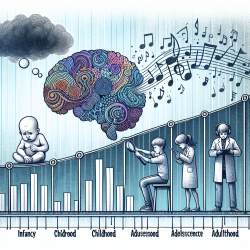Introduction
As practitioners dedicated to improving outcomes for children, it is crucial to understand the complex interplay between childhood neurodevelopmental difficulties and the risk of adolescent depression. Recent research published in the Journal of Child Psychology and Psychiatry highlights the significant role of irritability in this association. This blog will explore the findings of the study titled Childhood neurodevelopmental difficulties and risk of adolescent depression: the role of irritability and discuss how practitioners can leverage these insights to enhance their practice.
The Research Findings
The study utilized data from the Avon Longitudinal Study of Parents and Children, examining children with neurodevelopmental difficulties at ages 7-9 and their risk of developing major depressive disorder (MDD) during adolescence. The key findings were:
- Children with neurodevelopmental difficulties had a higher likelihood of developing adolescent depression (OR = 2.11).
- Irritability in childhood accounted for 42% of the association between neurodevelopmental difficulties and adolescent depression.
- Specific difficulties such as autism spectrum disorder (ASD), communication disorders, and ADHD were notably linked to depression, with irritability explaining 29%-51% of these associations.
Implications for Practitioners
Understanding the role of irritability offers practitioners a potential avenue for early intervention. Here are some actionable insights:
- Early Identification: Monitor children with neurodevelopmental difficulties for signs of irritability. Early identification can lead to timely interventions, potentially mitigating the risk of depression.
- Targeted Interventions: Develop interventions that specifically address irritability in children with neurodevelopmental disorders. This could involve behavioral therapies or parent training programs.
- Collaborative Approach: Work closely with parents, teachers, and other professionals to create a supportive environment that addresses both neurodevelopmental difficulties and emotional regulation.
Encouraging Further Research
While the study provides valuable insights, it also highlights the need for further research. Practitioners are encouraged to explore the following areas:
- Mechanisms of Irritability: Investigate the underlying mechanisms of irritability in children with neurodevelopmental disorders to develop more effective interventions.
- Longitudinal Studies: Conduct longitudinal studies to better understand the long-term impact of early interventions on depression outcomes.
- Genetic and Environmental Factors: Explore the genetic and environmental factors that contribute to irritability and depression in children with neurodevelopmental difficulties.
Conclusion
By understanding the role of irritability in the link between childhood neurodevelopmental difficulties and adolescent depression, practitioners can better identify at-risk children and implement targeted interventions. This approach not only addresses the immediate needs of the child but also contributes to their long-term emotional and mental well-being.
To read the original research paper, please follow this link: Childhood neurodevelopmental difficulties and risk of adolescent depression: the role of irritability.










